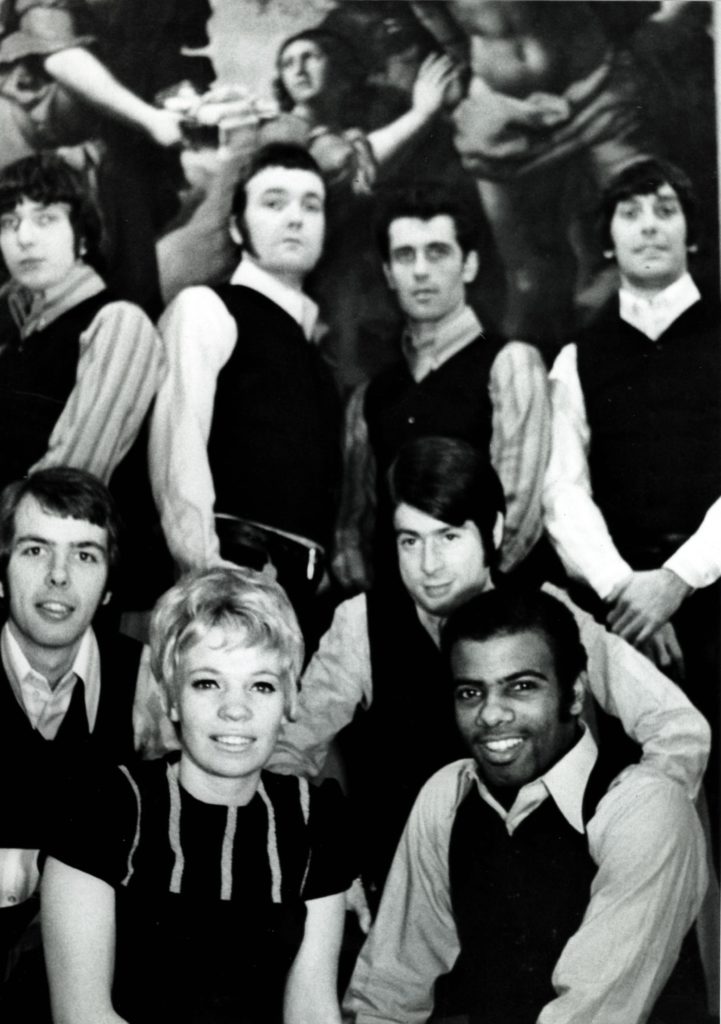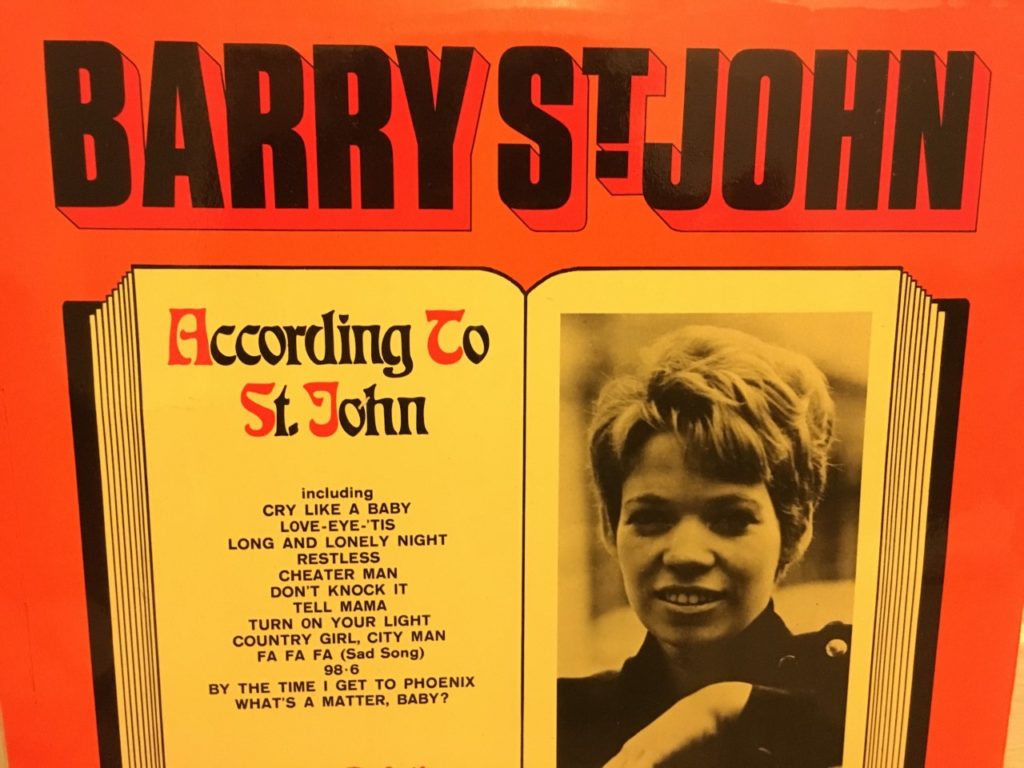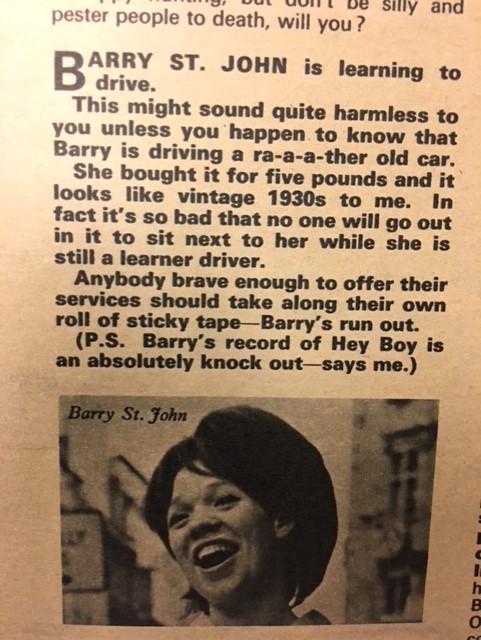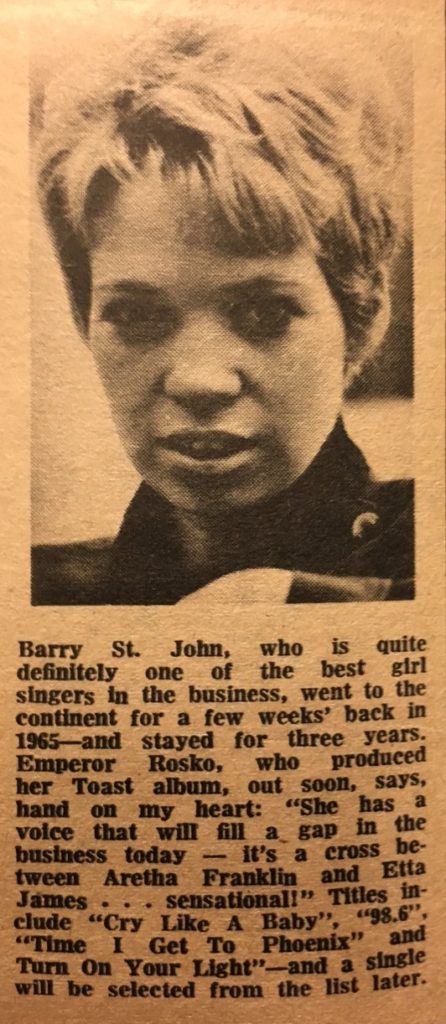By Nick Warburton
Scottish soul singer Barry St John recorded a brace of singles for Decca and Columbia in the Sixties before cutting a superb lone LP for Major Minor Records in 1968. During the 1970s, Barry St John became a noted session singer, appearing on records by John Lennon, Marc Bolan, Elton John, Bryan Ferry, Kevin Ayers and Pink Floyd among many others. The following interview was undertaken before Barry St John sadly passed away on 24 July 2020.
You were born Eliza Thomson in the Gallowgate area of Glasgow in 1943. What were you first musical ventures?
“I always sang but then everybody in Glasgow sings. We used to have what we called back court concerts. We lived in tenement buildings and there’s a back court which everybody shared. The kids would give concerts and the adults would run them, so I used to sing in them.”
“I had a best friend at school and she had a big brother called Tex. His friend was a fantastic guitarist called Tommy Danks who used to hear me sing. One day Iain Campbell wanted a girl singer and I got the gig. I was fourteen. I started singing with Iain’s group The Midnighters in the late 1950s which really was a baptism of fire. Iain was a big star in Glasgow. He had been on a Scottish BBC TV variety show called Dance Party Roof. When that split up, I went with The Playboys. Ralph Danks and John O’Hara were in them.”
During the summer of 1961, you hooked up with Glasgow legends, Bobby Patrick & The Big Six. How did that come about?
“One day I was up in a music store where all the musicians in Glasgow used to go and the guy behind the counter said, ‘Hey Lizzie, Bobby Patrick wants you to ring him. He wants you for a gig’. I rang Bobby up and he said, ‘We’re looking for a girl singer, do you fancy it?’ Archie Legget [from Iain Campbell’s old band] was in it and he was like my big brother. That was great. Alex Young [Angus and Malcolm Young’s older brother] joined about the same time as me.”
“The best time of my life was with Bobby Patrick and The Big Six. It really was. Bobby said they were planning to go down to London the next year and I’d been planning to do it on my own anyway so I joined. We arrived on 4 January 1962. We hardly had any money between us and didn’t have anywhere to live. We used to get lots of gigs on the American bases because we played that sort of music. It went down really well. I remember at the very beginning we got a gig up at Lakenheath in Suffolk and it was a long weekender. When we got to the gig I assumed we were going to sleep in the band wagon but we drove to this field and kipped in the haystacks.”
“It was really tough. We were starving at first. London is one of those places where you either stick it out or you don’t. We were all from the slums in Glasgow so we were quite used to roughing it. Also, all the musicians in Glasgow said: ‘You’ll be back’ and we said, ‘No, we won’t’. We were determined not go back.”
You then broke away and started a solo career.
“I was with The Big Six for two or three years. We went over to West Germany and some of the boys had met German girls so they wanted to stay there. I didn’t particularly want to stay in Hamburg. It frightened me a bit. Glasgow was tough but Hamburg was a different fear. We would see gang fights there. It was a different kind of world. When we came down to London, Soho was quite seedy but Hamburg was an eye opener. The guys were supposed to come back with me to London but wanted to stay out there. I got a record contract [with Decca] a while later and then the boys [briefly] joined me again. There was another group [The Embers] that also backed me and Roger Sutton was the bass player in that. Barry Martin was on saxophone, Gary Boyle on guitar and Clive Thacker on drums. They also backed Millie and I knew them from Hamburg. I was also in The Laurie Jay Combo [when I first came back from Hamburg].”
https://www.youtube.com/watch?v=JH8jmkXL8CY
Where did your stage name Barry St John come from?
“There used to be a dancer called Barrie Chase and I loved her. I said, ‘That’s a great name’. The ‘St John’ I nicked off Ian St John the footballer!”
Tell me about the Decca recordings.
“Ronan O’Rahilly who ran Radio Caroline had wanted to manage me and got me the Decca contract. I did a couple of records [four singles for Decca] but I never really like any of them. The nearest I came to doing what I wanted to do was the According to St John album [for Major Minor Records] that Emperor Rosko produced.”
“They [Decca and later Columbia] always gave me poppy-type songs. There was one track I did, it was a ballad-type thing and Dick Leahy and Ivor Raymonde decided that they were going to take me through it phrase by phrase. They kept stopping the recording and I sang exactly what they wanted. It was awful. Then I got a letter saying that they weren’t going to release it. They thought I needed more experience to sing songs like that!”
“The Decca recordings were with session musicians. Jimmy Page and Joe Moretti and people like that were on those recordings.”
“Although I was based in London, I would go out to Hamburg now and then and do a month here and there and hook up with The Bobby Patrick Big Six.” [Ed. On one of the trips in 1966, she was backed briefly by Sands.]
How did the switch to Columbia come about where you recorded two more singles, including your minor hit, “Come Away Melinda” in December 1965?
“That was Mickie Most. He’d seen me and come to a couple of gigs that I’d done years before that. He’d said that he’d always wanted to record me but it really wasn’t a good experience [recording] with him.”
You had met sax player Howie Casey, who you married in 1969, in Hamburg. How did you end up joining his group, The Krew?
“I was out in France working the American bases with a three-piece group from Nottingham. There was a bass player called Ray Brown. I thought that was funny because there’s a big jazz bass player with that name. When we had time off at weekends, I’d go up to Paris, [which is where I met up with The Krew]. I joined about mid-1967.” [Ed – see The Krew story for more information].

The Krew, Geneva, late 1967. Back row, left to right: Eddie Sparrow, Howie Casey, a South African organ player standing in, Archie Legget. Middle row, left to right: Ted Tunnicliffe, Iwan Roth. Front row, left to right: Barry St John (first pic with band) and Ernie Garrett Junior. (Photo courtesy of Eddie Sparrow).
As the band was splintering in late 1968, you landed a solo deal with Major Minor through Emperor Rosko.
“Rosko used to come into the club in Paris. He was great to work with. Some of the tracks on the album I really like and were the type of things that I wanted to do but there’s other things like ‘By Time I Get to Phoenix’; because they had to be done so quickly, there was no time to rehearse [the material]. I think I got that song that morning.”
“We did the LP at Trident Studios in Soho. The ones I’m most proud of are, ‘Cry Like a Baby’ and ‘Tell Mama’. I also like ‘What’s a Matter, Baby?’ Rosko was really keen for me to do ‘Cry Like a Baby’ and I was a bit worried that we’d be compared to Joe Cocker’s ‘With a Little Help From My Friends’. The single got quite a good reception. Sue and Sunny (aka Sunny Leslie and Sue Glover) and Lesley Duncan were on backing vocals and I think Madeline Bell was on it too. I knew them all and we’d become friends.”
“Iain Campbell had written ‘Turn on Your Lovelight’ and ‘Long and Lonely Night’. I said, ‘Let’s hear them’. He played them and I liked them. Iain was such a talented guy. He was a great song-writer but the booze got the better of him unfortunately. He was a really good pal to me.”
Did you do any promotional work for the LP after it was released?
“I did some radio stations and TV work [in the UK]. I also went to Paris and Germany but no touring. I ended up suing [label owner] Phil Solomon. I was reading a weekly rock magazine that Bill Harry edited one Saturday morning and the headline said ‘Barry you let me known’. I thought it was Barry Gibb because The Bee Gees were going through ructions at that time. I read the article and it was me. An English DJ who worked out in Holland accused me of not turning up for a TV show and going to Paris instead. What had happened was that Solomon’s wife had told me that the Dutch one was cancelled but the Paris one had come in which was the day after. As far as I knew it was cancelled. I was so upset, I ended up suing the Solomons and it got me out of my contract. That’s how I got into sessions really.”
So the split with Phil Solomon and Major Minor was the catalyst to move into session work?
“The very first session I did was for Denny Cordell during the 1960s and then I got a bit more work out of that. I think it was Lesley Duncan who got me [back] into session work and then it just took off. We were earning a lot of money and it was good because I could stay at home. My daughter was young and was at an age when I needed to be around.”
Didn’t you play on a John Lennon session for the Imagine LP?
“Yes, it was ‘Power to The People’ which Phil Spector produced. We all got a call. There were loads of us on it. Doris Troy, who was my big mate, was on it. Also Madeline Bell, Sue and Sunny. The Beatles were out in Hamburg when The Big Six first went out there and they used to ask me to come sit in with them for a song, so we knew them. On that session, John came up to me and said, ‘Aren’t you the little girl who used to sing with The Big Six in Hamburg?’ It was great that he remembered and I told him how the boys were doing.”
You had a prolific session career, working with artists as diverse as Pink Floyd and Elton John and Bryan Ferry and Steve Harley. How did the work come about?
“Most of the time people just rang you up. There were no agents. With Pink Floyd, I remember there were five sessions that day and the one for Dark Side of The Moon was the last one. It was all right but a bit weird. They didn’t seem to smile. I remember Lesley Duncan told somebody that she didn’t know what we had done wrong because they were so stand-offish. I knew David Gilmour from Paris in the 1960s because he’d worked with a group called The Flowers.”
“Most of the time you do the session and have a laugh with them, even the American guys. We worked with Elf and Ronnie Dio. They were great from the start. Nazareth were also great to work with. Steve Harley was lovely and Bryan Ferry was great fun too. The session for him was for ‘Smoke Gets in Your Eyes’. Elton John was Madman Across the Water, including ‘Tiny Dancer’.”
You returned to the studio in the mid-1970s and recorded some more solo material for both Decca and also the tiny Bradley’s Record label.
“‘I Won’t Be a Party’ on Bradley was produced by Pip Williams. I used to do sessions for Pip and I turned up and he said, ‘There’s a song on here and I’d quite like you to do it’. I sang it and the label released it.”
For more information, visit: theguardian.com/music/2020/aug/27/barry-st-john-obituary



